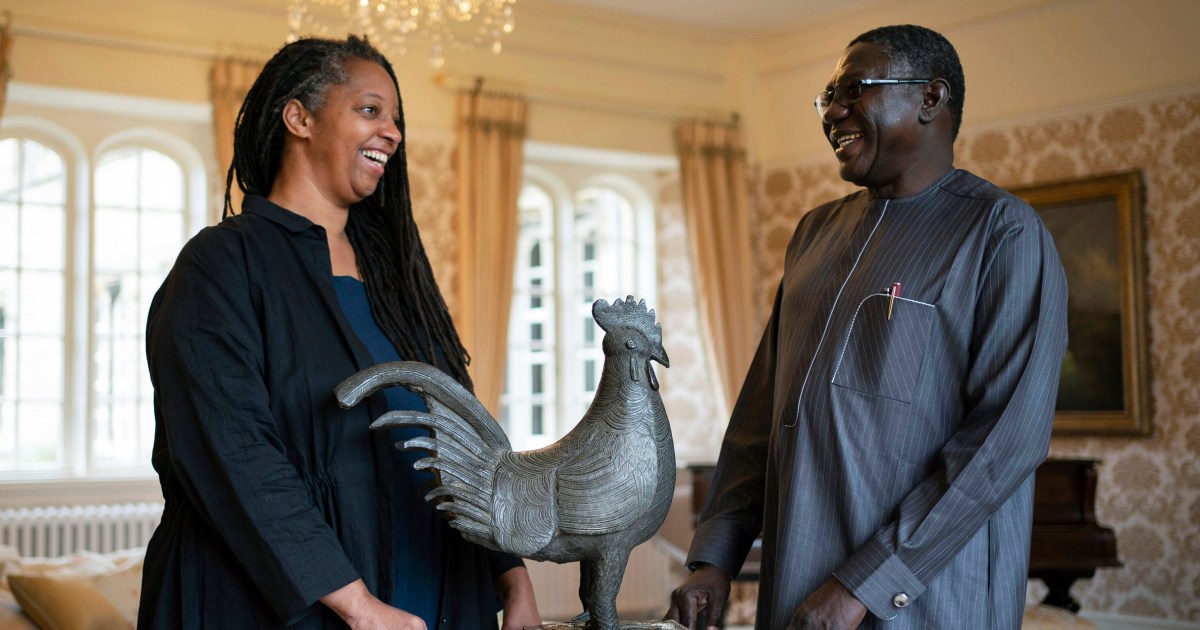[ad_1]
LONDON – Statues have been demolished and national icons reassessed, but Europe’s efforts to come to terms with its imperial past have largely ceased to return cultural treasures looted by the continent’s colonial powers.
Until now, maybe.
This week, a Cambridge college, a French museum and a Scottish university all returned artefacts looted from West Africa, with activists and officials hailing a potential turning point in the multi-year battle to ensure the calculation of l ‘Europe on the race extends to the restitution of what it looted.
Jesus College, Cambridge on Wednesday returned a bronze sculpture of a rooster in Nigeria, becoming the first British institution to return one of Benin’s famous bronzes. The next day, the University of Aberdeen in Scotland presented a bronze of the head of an Oba, or king.
These sculptures were looted, along with thousands of other works, from the historic Kingdom of Benin – located in modern Nigeria – when British forces invaded and destroyed much of Benin City in 1897. The Benin Bronzes, a A group of brass and bronze sculptures made since at least the 16th century, are widely regarded as one of Africa’s most culturally significant artifacts.
The British Museum still has bronzes from Benin in its collection in London, while others have made their way to collections around the world.
On Wednesday, the musée du quai Branly in Paris also handed over 26 artifacts in Benin, a former French colony that borders Nigeria, which were stolen in 1892. They are among the 5,000 works requested by the African country of the West, according to Reuters.
Amatey Doku, a former Jesus College student who was among those who proposed the repatriation of the college rooster in 2016, said this week’s discounts marked a “huge turning point.”
“For the Bronzes of Benin in particular, this moment will be seen as the real dismantling of the argument that this could not be done,” he said.
The returns will increase pressure on other Western institutions to follow suit.
More broadly, Doku said, they also shed light on the continuing legacy of colonialism in British and European institutions.
“The work is not done, it is not finished,†he added. “But I think it’s a really important moment.
Abba Isa Tijani, of the Nigerian National Commission on Museums and Monuments, said Wednesday’s handover in Cambridge provided an opportunity for other institutions and countries.
“Jesus College led by example,†he said in a video posted to Twitter.
This week’s wave of activity follows a decision by Germany earlier this year to work on its own plan to return Benin bronzes, in which Foreign Minister Heiko Maas describe as a “turning point in the treatment of our colonial history”.
In 2017, French President Emmanuel Macron declared during a visit to Burkina Faso that it was no longer acceptable that a large part of the cultural heritage of several African countries remained in France.
The following year, a report, commissioned by Macron, recommended that French museums return works taken without consent if African countries so requested.
This marked a crucial step on the way to this week’s developments, said Barnaby Phillips, author of “Loot: Britain and the Benin Bronzes”.
“Although this report only concerned France, I think it sent shock waves through the museum world and particularly affected the other great colonial powers, Germany and the United Kingdom,” he said. -he declares.
Then came the toll that followed the murder of George Floyd while in Minneapolis Police custody in May 2020. While the fallout in America has largely focused on police violence and legacy of slavery, in Europe much of the emphasis has been on the lingering impact of colonialism.
“This, again, put European museums in the spotlight,†said Phillips.
The British Museum recently received a letter from the Nigerian government requesting the return of the country’s antiques. A spokesperson said the museum was reviewing the documents and would process them fully in due course, adding that it was hosting a group meeting this week in which “developments regarding the return and restitution of Beninese works to the Nigeria “were discussed.
“The museum understands and recognizes the importance of issues related to the return of objects and is working with communities, colleagues and museums around the world to share our collection as widely as possible,” the spokesperson added.
The institution has a strict policy on the permanent removal of art from its collection which is governed by a law of 1963, called The British Museum Act.
Souleymane Bachir Diagne, director of the Institute for African Studies at Columbia University in New York, agreed with Doku that this week’s transfers were a turning point.
“It will be much more difficult for many museums to refuse [to] even to discuss whether some Beninese bronzes have already been returned, â€he said, adding that museums are also under pressure from public opinion to justify the presence of African artefacts in their homes. collections.
In addition, said Diagne, the countries of the South would now be a player in the circulation and exchange of museum artefacts, as they will now own these works.
This is an outcome that Doku also wants to see.
“It’s not about these artifacts going back to their country and never being seen again, it’s about the ownership of these pieces in the right place,” he said.
[ad_2]

